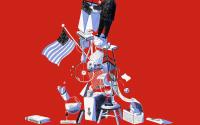25 May 2006The Guardian
 A British soldier from 16 Air Assault Brigade on patrol in Helmand Province, Afghanistan. Photo: John D McHugh/Getty
A British soldier from 16 Air Assault Brigade on patrol in Helmand Province, Afghanistan. Photo: John D McHugh/Getty
Launching the International Institute for Strategic Studies' (IISS) annual assessment of global security threats, John Chipman, its director general, said: "Many parts of the world are engaged in brutal combat ... Overall, the dangerous triptych of Iraq, Afghanistan and Iran continues to dominate the security agenda as do the wider, iconic problems of terrorism and proliferation."
The warning came as crucial talks on Iran were held in London, Tony Blair and the Iraqi prime minister, Nuri al-Maliki, pursued a planned troop handover in Iraq, and Taliban attacks on Nato troops in Afghanistan intensified.
Dr Chipman said the new Iraqi government faced "fundamental challenges" that could quickly overwhelm its attempts to hold the country together and invite regional intervention. "It is doubtful that a collective sense of Iraqi nationalism can survive in a context of increasing sectarian violence and the continuing security vacuum. Democracy has exacerbated Iraq's ethnic and religious tensions, with voters largely dividing along Sunni, Shia and Kurdish lines."
The parliamentary committee charged with amending Iraq's unfinished constitution was unlikely to deliver political compromise but was certain to become the focus of new acrimony, especially among Sunnis. "The danger is clear: an increase in instability, violence and radical Islamism," Dr Chipman said.
"There is a great deal of worry about the speed at which the Iraqi army and police forces have been stood up," said an Iraq specialist, Toby Dodge. He described Mr Blair's troop withdrawal timetable, due to begin in July, as "optimistic" and predicted it could lead to greater insecurity this year.
Presenting the report, entitled The Military Balance, Dr Chipman warned of a rising Taliban insurgency in Afghanistan aimed at British and Nato troops who are replacing some US forces. "This year will be crucial for Afghanistan as well as for Nato as it expands its mission into the south," he said. "The Taliban are likely to increase their operational tempo - not least because they know that casualties among European Nato states may mobilise domestic opinion against the war."
British-led efforts to eradicate Afghanistan's heroin production also "carry high risks to international forces as they will come into direct confrontation with the local population and the Taliban".
The IISS said North Korea had obtained enough plutonium to build between five and 11 nuclear weapons and long-running talks to induce Pyongyang to disarm were at an impasse.
In an implicit criticism of Washington's policy of ostracism and financial sanctions, Dr Chipman said North Korea had concluded that "the Bush administration is not serious about negotiations and [has] hostile intent".
The US approach had also caused splits with its partners in the six-party talks. Meanwhile, Pyongyang continued to move towards additional nuclear weapons capabilities.
The report also highlighted growing US concerns about China's military build-up and intentions, quoting the findings of the recent US Quadrennial Defence Review. It said China was "a power at a strategic crossroads that is still pointing largely in the wrong direction and which has the greatest potential to emerge as a military rival to the US".






